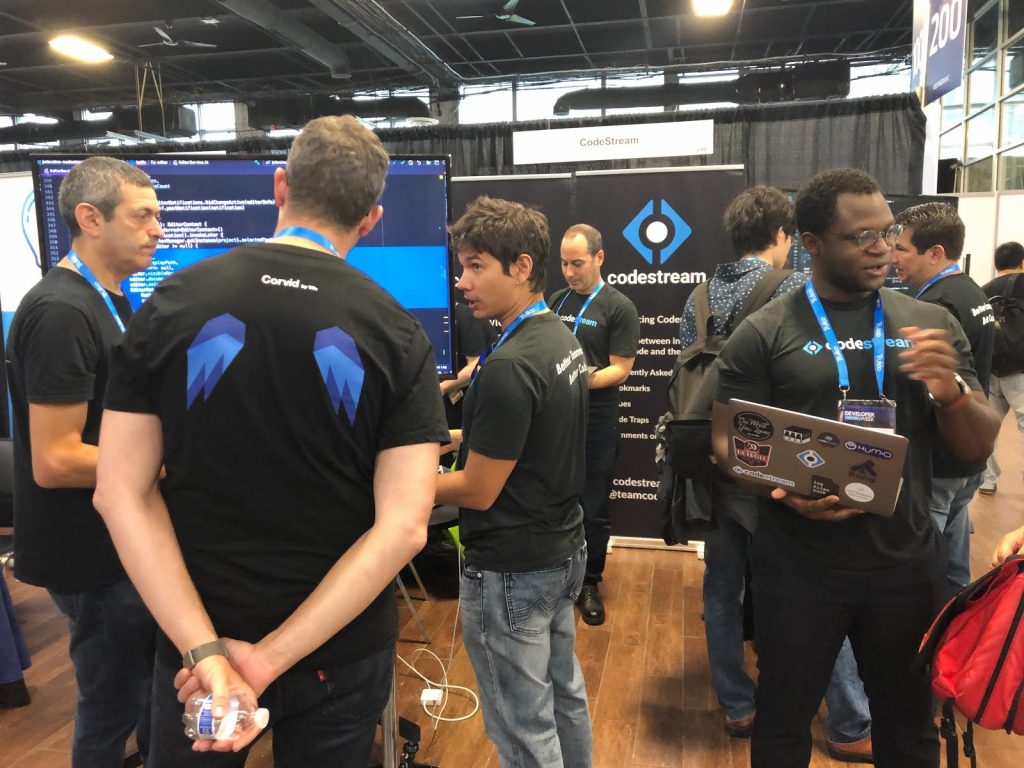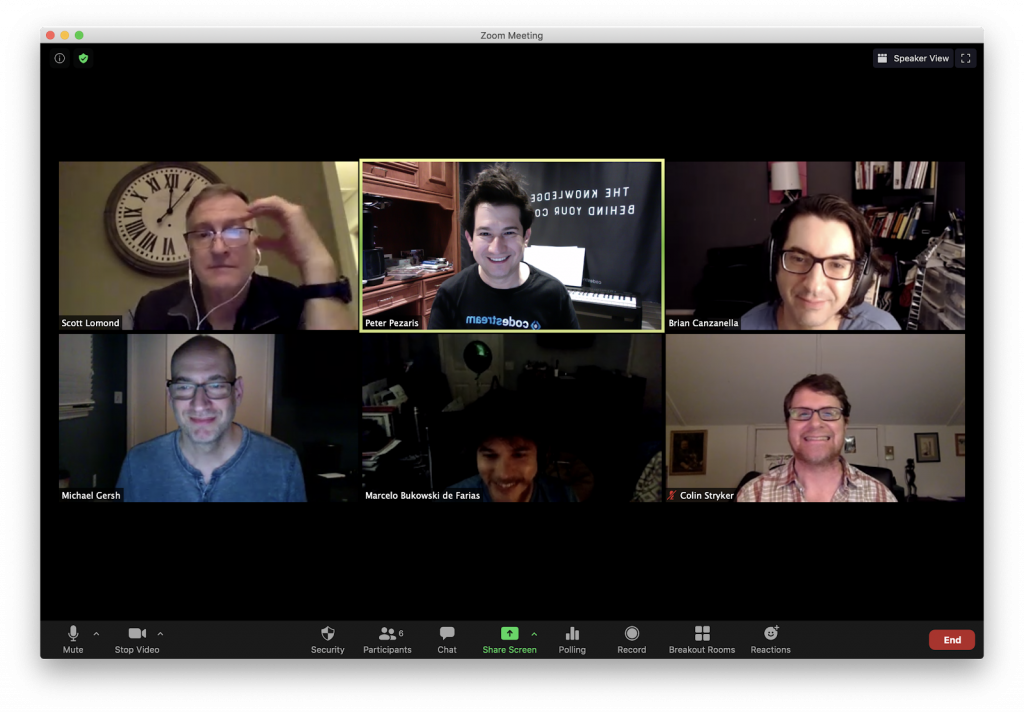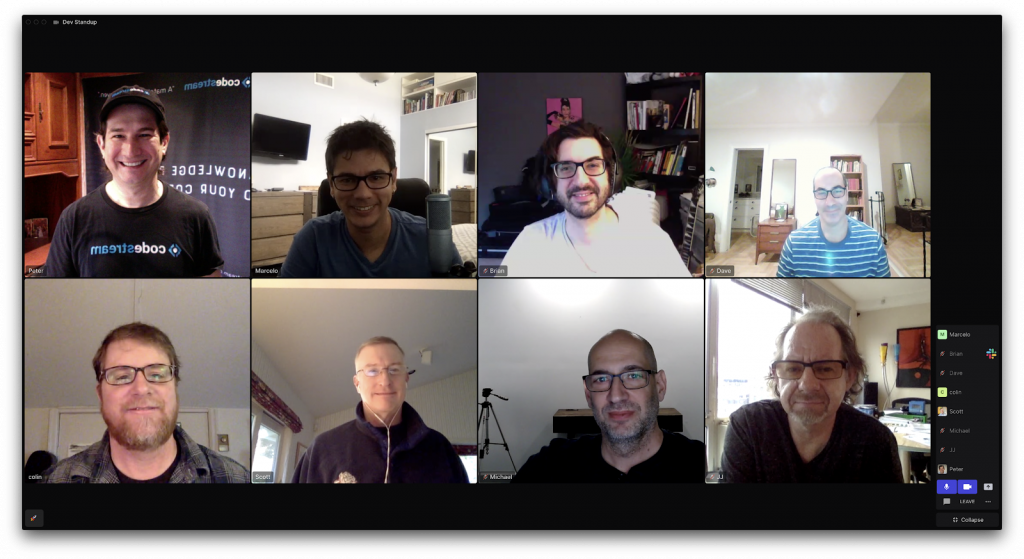1. Hey, can you please introduce yourself?
My name is Peter Pezaris, and I’m the CEO of CodeStream. I’ve been an entrepreneur and CEO for the last 25 years, and I’ve had the good fortune of working with the same senior management team for that whole time. Our first business, Commissioner.com, moved fantasy sports online in the late 1990s. Our second, Multiply, was an early leader in social commerce. The third business, Glip, is a team chat solution which we sold to RingCentral in 2015 and has powered their messaging apps since.
I’ll be answering these questions mostly from the perspective of a CEO who manages a remote team, in addition to adding my perspective of how I personally find it to work remotely myself.

2. What motivated you to choose remote working?
In 2001 our business moved from New York City to Florida after being acquired by CBS SportsLine. Most of the employees moved, but many returned to New York over the next few years. We learned to work together across cities, which was initially a challenge, but we relied heavily on tools for remote work. Thankfully, those tools have become better and better over the last two decades.
After being a part of Y Combinator in the W18 batch, we learned about GitLab’s all-remote philosophy and were surprised that more than half of our batch had similar plans. At that point we were mostly remote, and we made the decision to go full-remote after YC.
3. What were your initial months like? Did it live up to your expectations?
Our first remote experience was actually all the way back in 1997, before video calls were possible. We had just started our business and had nothing more than a few thousand dollars. In fact, we didn’t have enough money for both apartments and an office, so Mike and I decided to give up our apartments and sleep on the floor of the office. A third employee lived on a different side of the city, so each evening we’d call him on a speakerphone and just keep the line open for hours. It’s surprising how much more efficient communication can be if you know you can just talk, and the other person, even if they’re in another location, can hear you.
We’ve been at this for years, so my insight is that as the tools have gotten better, there’s no real business justification for paying for expensive offices anymore. The benefits you get from a global workforce to hire from, and keeping everyone happy by letting them work in the city they prefer, far outweigh the downsides.
The thing I miss the most is the social aspect; it’s harder to meet socially, and although Zoom happy hours help a little here, we miss being able to get together in person more often. Obviously, Covid has made this even worse in 2020.

4. How do you make remote hires?
We have been working in a remote environment for many years, so the most important thing when hiring new employees to join the team, is to make sure that they understand the unique challenges and opportunities of working remotely. Now that Covid has forced the issue, everyone is finding their own way to adapt.
The ideal remote worker is someone who can take initiative on their own and find motivation independently, since the buzz of the office isn’t as available. Good managers will check in with coworkers more often, to make sure everyone is working well and understands how they can be most effective.
5. What have been the best, good and worst aspects of remote working for you?
The best aspect of remote working for me is that I get to spend more time with my wife and my family. I tend to work very long hours, so not having to waste time commuting back and forth to the office means I can work hard and still maintain a good family life.

I’ve also found that investing a little in my home office, such as getting a good monitor, a good chair, good lighting, etc. makes my day much more pleasurable. I’ve recently hooked up a DSLR to my computer to improve the quality of video on Zoom calls, and the fact that I’m so excited about such a small upgrade is the most 2020 thing ever 😉
The biggest downside is that although I get to see my coworkers virtually, socialization is much more difficult. Right before Covid hit we had a 2-day off-site in Texas at a beautiful house where we planned out the next several quarters of strategy, but also ate, drank, and laughed together, which was an experience I won’t soon forget. We haven’t yet found a way to replicate that virtually, but we’re still trying.
6. What’s been the most challenging aspect of managing a remote team?
When coworkers aren’t performing well, it’s harder to tell what’s going on. In the office, you can more easily see if someone is sad or anxious, and pull them aside to make sure they are okay. Given the rigors of many remote meetings, there isn’t as much opportunity to read each others’ body language. Variance in performance can be due to a large number of reasons, some of which you can help with directly, so understanding what’s wrong is critically important.
7. What tools do you swear by while working remotely?
Zoom, Slack, GitHub and of course for our development team we’d be lost without CodeStream! Some more modern/unknown tools that we also appreciate are Mio (slack<=>ms teams channels), Tandem (Zoom alternative), and Slite (notes for teams).

8. Your most exciting/ hilarious experience since you started working remotely.
We recorded a music video from our different locations. We happen to have a number of musicians as employees of CodeStream, so it was a ton of fun to do, and laugh at ourselves a little bit.
Singing is obviously not our strong suit:
9. What is your golden advice to a new remote worker?
Make sure to spend a good amount of time each and every day of your first few months on Zoom, or a Zoom equivalent. It’s incredibly important to replace serendipitous conversations that remote work largely lacks, and to start to develop good personal and social relationships with your peers. If you used a specific tool at your old job, don’t feel shy about recommending it at your new job.
For new dev hires, I’ll plug our current product. CodeStream makes it super easy for developers to ask questions about an unfamiliar codebase, and come up to speed more quickly. CodeStream also helps with general collaboration around code, streamlining the workflow experience especially for remote teams.
10. What is your golden advice to a leader managing a newly remote team?
Take time to socialize with your new teammates, even if it’s through remote tools. Set up happy hours, and if those are lightly attended, figure out a different way to get people involved. If you’re going on a hike, post a message and see if anyone wants to do a group video call and hike where they are. Encourage the team to get to know each other beyond the rigid work they have assigned.
Take extra care to hire people who will fit into your remote culture well. If you’re hiring in a different timezone, for instance, be sure to set expectations in terms of hours of work and availability. If you’re hiring someone from a different country, make sure that there isn’t a language/communication barrier that would impact efficiency. But most of all, hire someone who you think will be able to thrive as a self-motivating employee.
Finally, although it is true that communication is important for any team, when you’re remote, it’s even more important, so make sure you have the right pathways to share company news and events with your team, and for your team to ask questions about how things are going. Keeping everyone in the loop is key to team morale and motivation.
11. How do you see your career shaping up and your goals?
My goal has always been to be the CEO of a Fortune 500 company. Knowing the way that I like to work, that’s much more likely for me if I grow our current business to be in that elite club, rather than by climbing the corporate ladder of an existing, established company.
I’ve had the good fortune of three exits already, so even if I don’t achieve my ultimate goal, I already consider myself very lucky. I can’t imagine there’s a more rewarding career accomplishment than starting from nothing, building a business, and creating enough value that someone pays you millions of dollars for it. I’ve now had the privilege of doing that three times, and each time with my best friends.
Sometimes my mom asks me why I still work so many hours, given what we’ve already accomplished, but the truth is that I love my job, and I love my co-workers, and I absolutely love the idea of making remote development teams around the world more productive with the tools we are building.
12. How do you expect remote working to evolve in the future?
I don’t think I’m alone in saying that Covid has forever changed the composition of remote workers everywhere. Major companies have already announced the shift to all-remote, and given the uncertain timeline of ending the pandemic, with some estimates that it will be years, it will be a permanent shift.
This has profound implications for some industries such as corporate real estate, we-work style offices, and industries that support office logistics, but for the information worker the differences will be more subtle. Importantly, smart companies will embrace the shift to remote as permanent now, and prepare themselves for an all-remote future in perpetuity.
Companies will invest more in work-from-home offices, both from a hardware, furnishings, and software perspective, and re-invest saved office rent money on remote tools that make their employees happier and more productive from home.
13. Where can we follow you on?
https://twitter.com/pezster
https://www.linkedin.com/in/ppezaris
https://github.com/ppezaris